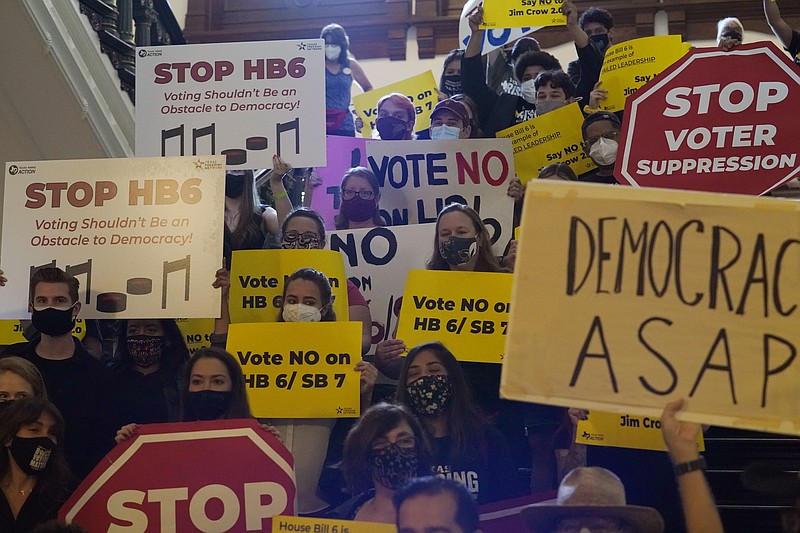AUSTIN, Texas -- Democrats left the Texas House in protest late Sunday in an effort to kill a GOP-backed voting bill that would make it easier to overturn an election and would implement a variety of voting restrictions.
About 10:45 p.m., the last remaining Democrats needed to keep a quorum of 100 members streamed out of the chamber. Debate on the bill abruptly stopped as Republicans huddled around Republican Speaker Dade Phelan. Rep. Carl Sherman, a Democrat, said members had no choice but to remove themselves from the vote.
"Unfortunately it looks like that is the only option we have, according to a senior member of the Republican Party who said we would not have an opportunity to speak against the bill," Sherman told The Dallas Morning News. "And that's not a democracy to me. I guess they were sick and tired of hearing our views on this. They decided they were going to ram this down our throats."
[Video not showing up above? Click here to watch » https://www.youtube.com/watch?v=liMH3GcQtGI]
Democrats walked out without fanfare, trickling out in groups and heading to an area church.
This is only the fourth time Texas lawmakers have broken quorum to protest passage of a bill. The last time was in 2003, when a group of about 50 Democrats fled the state in the middle of the night to Oklahoma in protest of redistricting. The rare show of protest occurred twice before that, in 1979 and 1870.
It was unclear where or for how long Democrats will secret themselves away. The legislative session ends today, and anything not passed by midnight is effectively dead for the year -- unless the governor revives it in a special session. Late Sunday, Republican Gov. Greg Abbott tweeted that he would do just that.
"Election Integrity & Bail Reform were emergency items for this legislative session. They STILL must pass," Abbott tweeted. "They will be added to the special session agenda. Legislators will be expected to have worked out the details when they arrive at the Capitol for the special session."
The House vote is the last barrier to sending Abbott a raft of election changes that would eliminate drive-thru voting, empower partisan poll watchers and impose new requirements in order to cast a ballot by mail in Texas.
Earlier Sunday, the Texas Senate muscled the bill through shortly after sunrise after bringing it up for a vote in the middle of the night on Memorial Day weekend, when the state Capitol was all but empty.
Republicans added language that could make it easier for a judge to overturn an election and push back the start of Sunday voting, when many Black churchgoers head to the polls. The measure would also eliminate drive-thru voting and 24-hour polling centers, both of which Harris County introduced last year.
The bill would empower partisan poll watchers by allowing them more access in polling places and threatening criminal penalties against election officials who restrict their movement.
Texas is the last big battleground in the GOP's efforts to tighten voting laws, driven by former President Donald Trump's claims that the 2020 election was stolen. Georgia and Florida have passed new restrictions, and President Joe Biden on Saturday called Texas' bill "an assault on democracy."
Election officials would also face new criminal penalties, including felony charges for sending mail voting applications to people who did not request them. The Texas District and County Attorneys Association said it had counted in the bill at least 16 new, expanded or enhanced crimes related to elections.
The change is "going to disengage, disenfranchise," said Democratic state Rep. Nicole Collier, chairwoman of the Texas Legislative Black Caucus.
Pressed on why Sunday voting couldn't begin sooner, Republican Sen. Bryan Hughes said, "Election workers want to go to church, too."
Collier was one of three Democrats picked to negotiate the final version, none of whom signed their name to it. She said she saw a draft about 11 p.m. Friday and was asked for her signature the next morning.
The top Republican negotiators, Hughes and state Rep. Briscoe Cain, called the bill "one of the most comprehensive and sensible election reform bills" in Texas' history.
Information for this article was contributed by Lauren McGaughy and Gromer Jeffers Jr. of The Dallas Morning News (TNS); and by Paul J. Weber and Acacia Coronado of The Associated Press.







